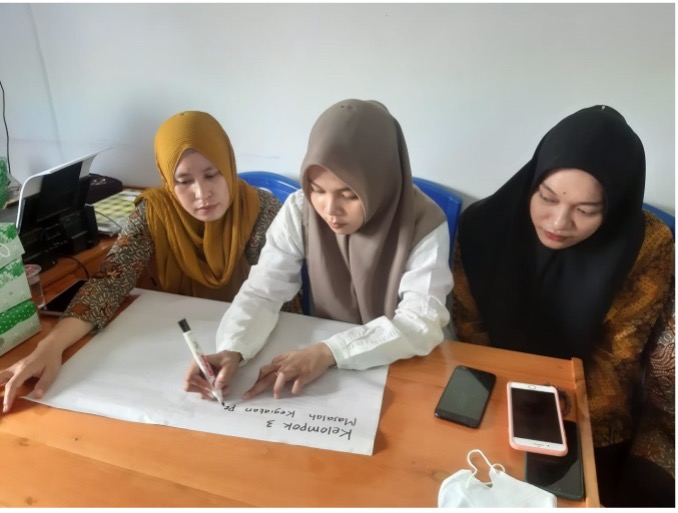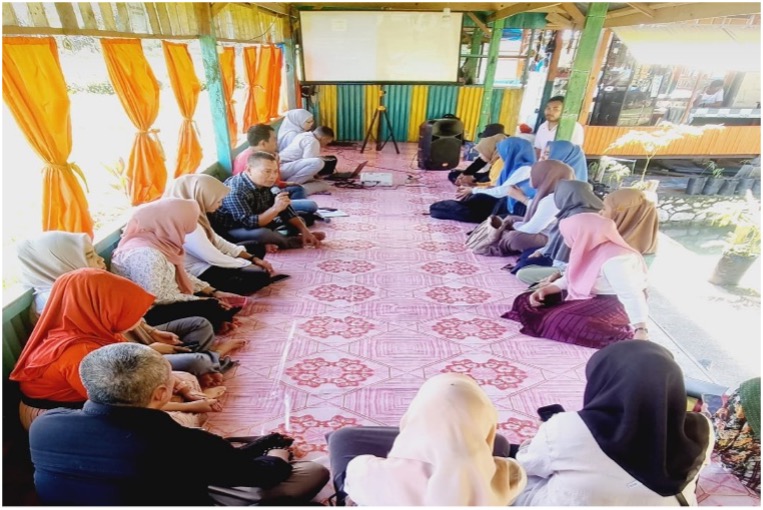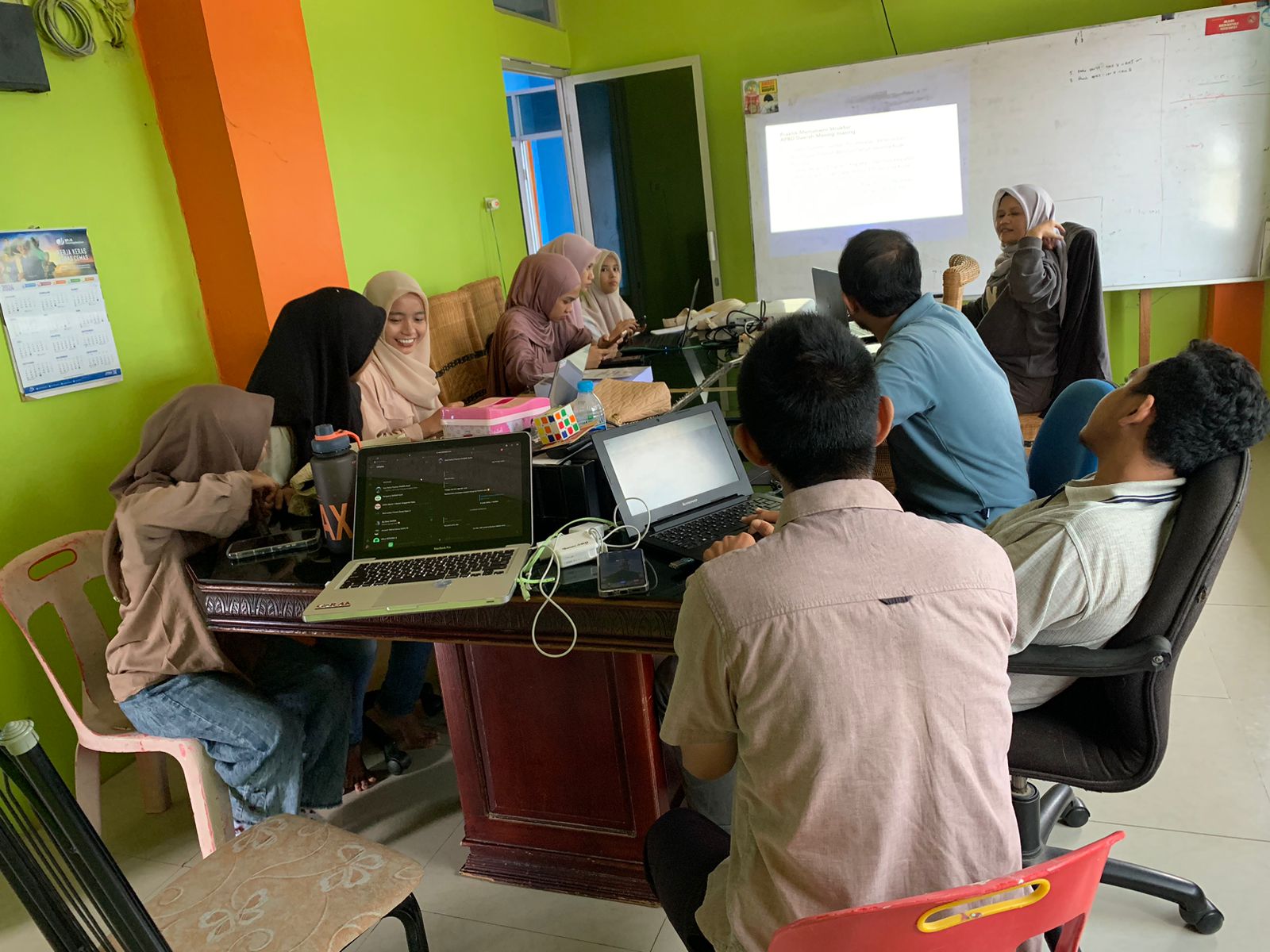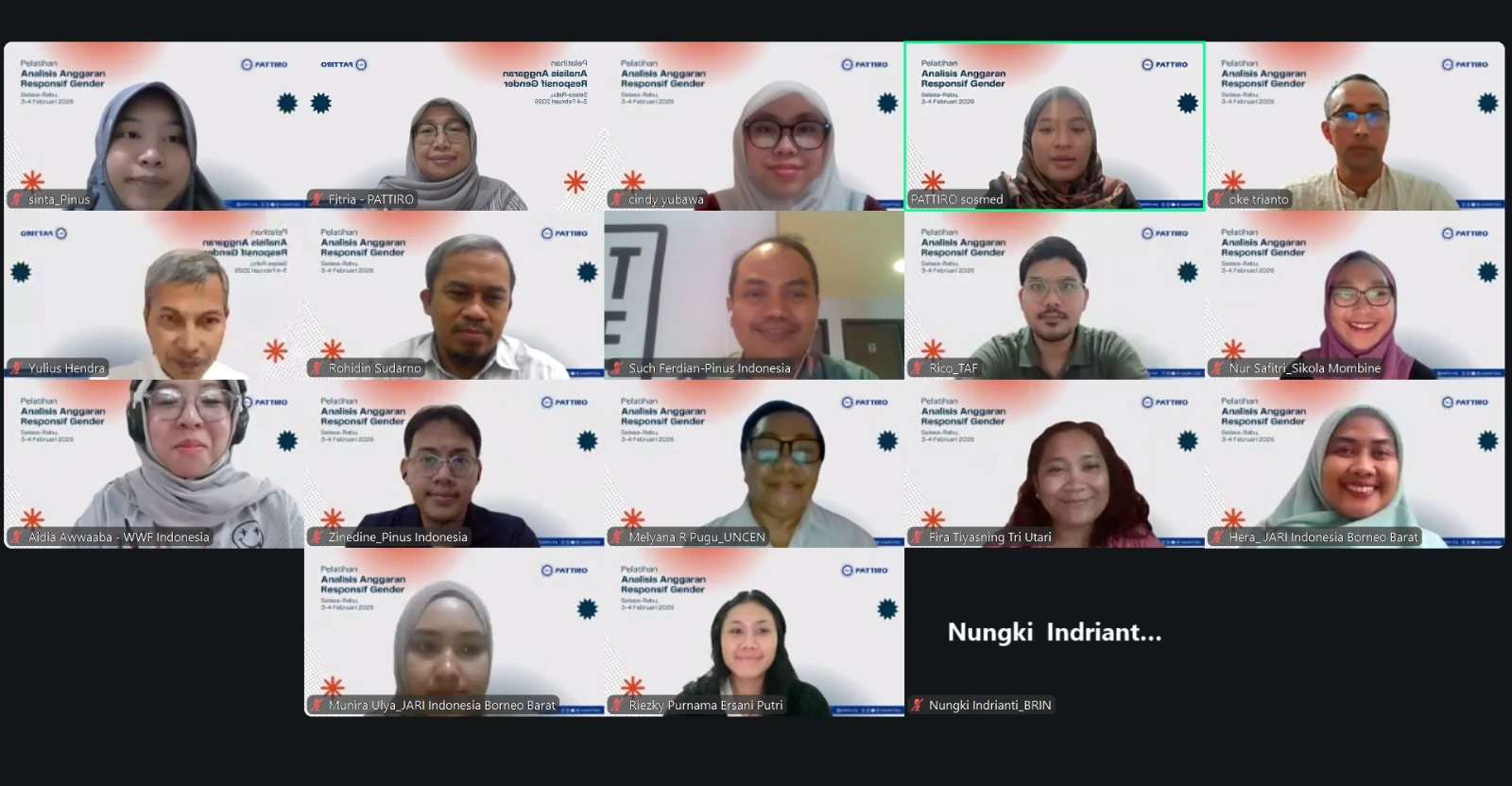
Aware of the lack of participation of women and youth groups in regional planning and budgeting on environmental conservation programs, civil society groups were moved to initiate grassroots forums to provide capacity building to the community related to local governance. PATTIRO through the support of the Asia Foundation photographed this good initiative in the EFT Women Talk Show held online via zoom on Wednesday, January 8, 2025 and Thursday, January 16, 2025.
Women budget literacy, encourage the effectiveness and inclusiveness of village funds in Maros Regency
In the first episode (8/1) entitled “The Role of women in driving Environmental Development”, PATTIRO in collaboration with PINUS South Sulawesi and Maros Muslim University (UMMA) photographed the budget Reading Community (KBA) initiative in Maros regency, South Sulawesi. This community was initiated by PINUS Sulawesi Selatan to increase transparency and participation of the community, especially women’s groups, in effective and inclusive village budget planning and management.
Nuraena, one of the KBA activists revealed that in Maros Regency, environmental issues are still a foreign matter for women in the village. Therefore, she and her colleagues at KBA actively socialize environmental issues through a direct approach to women’s groups in the village. KBA initiates various activities to improve the capacity of village women in understanding village budget planning and management and actively sends delegates to participate in Village development meetings (Musrembangdes).
The effort was sweet. The Maros Regency government welcomes KBA’s initiative by accommodating the aspirations of this community in environmental issues, namely incorporating waste management issues into regional strategic issues and encouraging KBA to get involved in waste bank management, environmentally based small businesses, and village organic farming. Based on Sudirman, a member of Bappelitbang Kabupaten Maros, his party has also integrated gender analysis in regional planning, including providing sorting data for beneficiaries of local government programs.

In the future, KBA needs to continue to be developed in Maros Regency. Currently, KBA is present in 12 villages in Maros Regency as a partner of the Maros Regency government in guarding local budget transparency, especially at the village level in environmental conservation programs. Nurjaya, Vice Rector of UMMA, revealed that campus programs, such as Kuliah Kerja Nyata (KKN), can also collaborate to increase the capacity of KBA activists in the village.
Anti-Corruption Youth Group guards Green Budget in Aceh province
Based on a survey conducted by Indikator Politik Indonesia and Yayasan Indonesia Cerah, more than 80% of young people in Indonesia in the age range of 17-35 years have concerns on the issue of eradication corruption and the climate crisis. This is an active instigator of women and young people in maintaining the environment in a participatory manner in Aceh province.
In the second episode (16/1) entitled “The Role of women and young groups in advocating a Green Budget in Aceh”, PATTIRO together with GeRAK Aceh and Tengku Umar University photographed a good initiative initiated by the Aceh Anti-Corruption School (SAKA) Anggran Hijau in increasing the capacity of young groups to oversee environmental conservation budgets in Aceh province.
Ramadhan Fitriani, a student at SAKA, revealed that SAKA has a goal to provide understanding to young groups regarding budget governance, learn about corruption eradication efforts, and expand the network of fellow anti-corruption activists from different backgrounds. As a school, SAKA also has a structured curriculum and has modules compiled by GeRAK Aceh activists based on their advocacy experience in overseeing environmental budget governance in Aceh province.
Ramadhan also continued that he and his friends in SAKA get the task to produce authentic output in each of his troops. This is a challenge for young groups who have wild ideas and high persistence on corruption and environmental issues. SAKA participants were also involved in GeRAK Aceh advocacy activities, such as assessments related to the readiness of TAKE programs in two districts in Aceh province that received incentives, women’s empowerment through economic classes, and training in villages.

The local government welcomes the active role of mudan and women groups in environmental conservation programs, both through SAKA and other partners. Dewi Marlina, head of the Environment Department of Perkim and environment of Aceh Barat Daya Regency, explained that the involvement of women and young groups in Aceh province in environmental issues is quite large. The women’s group is active in the management of economically valuable organic waste, while the young group is actively involved in the climate Village Program (Proklim) as an adaptation, mitigation, and institutional effort for climate change in the village.
Rahmat Pramulya, Coordinator of the Master’s program in Agricultural Sciences at Tengku Umar University also told about the role of young groups through the campus in advocating environmental preservation. As a pioneer of a green campus in Aceh province, students at Tengku Umar University also conducted an assessment in a peat village that had a land fire problem to understand the peat ecosystem in Aceh province. This activity is also an event to introduce young groups to the local context and strengthen connections between students and the local community.
Getting appreciation from the Central Government
The central government who attended the talk show appreciated and gave a positive response to the initiatives undertaken by the KBA and SAKA.
Eko Novi Ariyanti Rahayu Damayanti, assistant deputy of Gender mainstreaming for social and Cultural Affairs of the Ministry of women’s empowerment and Child Protection (KemenPPPA) revealed that village regulations (Perdes) related to the involvement of women and young groups and the village budget allocation for women’s empowerment are important indicators in the women and Child-Friendly Village Program.
Eko also added that currently the KemenPPPA has a public participation Forum for women and children (PUSPA) which focuses on the welfare of women and children. This Forum can be an opportunity for collaboration between initiatives initiated by civil society and stakeholders in the region to support women’s empowerment.
Ernawati Eko Hartono, gender mainstreaming Working Group of the Ministry of Forestry also revealed that the Ministry of Forestry has various programs that focus on Environmental Education and environmentally friendly behavior, such as Sekolah Adiwiyata (Green School), Climate Generation Camp (CGC), Climate Innovation Generation Program (CIGPRO), Climate Generation Summit, Nature Conservation cadres, and many others. He also added that there is a small grant from the Environmental Fund Management Agency (BPDLH) of a maximum of IDR 250 million that can be used by Adiwiyata schools, communities, and individuals for environmental preservation and gender mainstreaming efforts.
Related to gender mainstreaming commitment, Ernawati said the Ministry of Forestry has a Gender school as a container for capacity building which is opened for three main classes, namely classes containing ECHELON 2 officials and head of the Hall; classes for state civil servants (ASN) in the Ministry of Forestry; and classes for young ASN. Gender education in the Ministry of Forestry is also supported by the presence of Gender learning system (Sragen) which is a transparent information portal to improve community access to gender empowerment programs.




